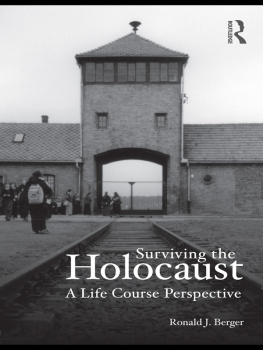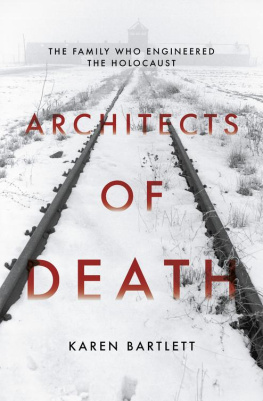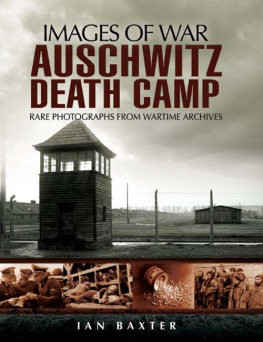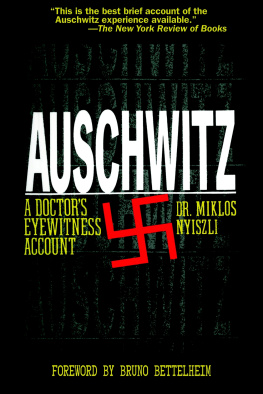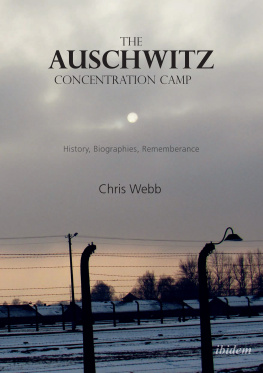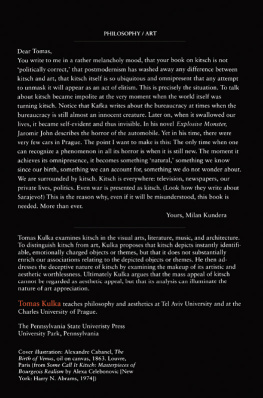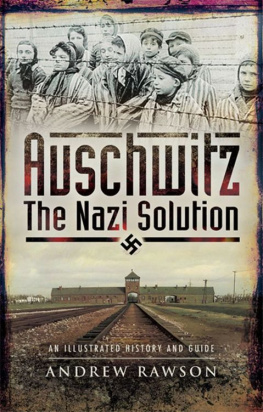Landscapes of the Metropolis of Death
OTTO DOV KULKA
Landscapes of the Metropolis of Death
Reflections on Memory and Imagination
Translated by RALPH MANDEL
THE BELKNAP PRESS OF HARVARD UNIVERSITY PRESS
Cambridge, Massachusetts
2013
Copyright Otto Dov Kulka, 2013
All rights reserved
Jacket design: Graciela Galup
Jacket art: Stephen Carroll/Trevillion Images
First published in the United Kingdom by Penguin Books Ltd., 2013
First Harvard University Press edition, 2013
Text originally written in Hebrew and translated by Ralph Mandel, except Ghetto in an Annihilation Camp, which was first presented in English at the Fourth Yad Vashem International History Conference, January 1980, translated from Hebrew by Ina Friedman and first published in The Nazi Concentration Camps, edited by Yisrael Gutman and Avital Saf (Jerusalem, 1984; also published in the same year in Hebrew, by Yad Vashem Publishers, Jerusalem). The text is republished with permission of Yad Vashem.
A Prologue that could also be an Epilogue, the section of chapter 2 called Ode to Joy, chapter 9 (under the title Landscapes of a Private Mythology and the Gate of the Law) and chapter 10 (under the title In Search of History and Memory) first published in English in On Germans and Jews under the Nazi Regime: Essays by Three Generations of Historians: A Festschrift in Honor of Otto Dov Kulka, edited by Moshe Zimmerman (The Hebrew University Magnes Press, Jerusalem, 2006).
Typeset by Jouve (UK), Milton Keynes
Library of Congress Cataloging-in-Publication Data
Kulka, Otto Dov, author.
Landscapes of the metropolis of death: reflections on memory and imagination / Otto Dov Kulka ; translated by Ralph Mandel.
p. cm.
Includes bibliographical references.
Text originally written in Hebrew and translated by Ralph Mandel, except Ghetto in an annihilation camp, which was first presented in English at the Fourth Yad Vashem International History ConferencePublishers note.
ISBN 978-0-674-07289-3 (cloth : alk. paper)
1. Holocaust, Jewish (19391945)Influence. 2. Holocaust, Jewish (19391945), in literature. 3. Auschwitz (Concentration camp) 4. Memory. 5. Kulka, Otto Dov. I. Title.
D804.3. K79 2013
940.5318dc23 2012041721
There remained the inexplicable landscape of ruins. History tries to explain the inexplicable. As it comes out of a truth-ground it must in turn end in the inexplicable.
after a parable by Kafka
Contents
I wish to thank all those whose initiative, skill and willingness to engage me in an ongoing dialogue made this book possible in its present form, first of all Chaia Bekefi, who persuaded me to start recording my reflections. No less meaningful for me were the comments and reactions of readers of the previously published excerpts in English and German, some of whom also read the whole manuscript in its Hebrew original or in the excellent English translation by Ralph Mandel. I greatly enjoyed working with him. Much appreciation is also due to the two translators of the previously published sections of the German version, Anne Birkenhauer and Noa Mkayton, to Gerald Turner, the translator of the three poems by an unknown poet from Auschwitz, as well as to the translator of my article reprinted in the appendix to this book, Ina Friedman.
I owe special thanks to my Israeli-American colleague Saul Friedlnder, who was the first to listen to the initial tape-recordings and encouraged me to publish them, though at the time I did not wish to mix my scientific publications with what I call my Ausserwissen-schaftliches (extra-scientific-writings). I am equally grateful to the German literary historian Heinz Brggemann, who initiated the publishing of the German excerpts and provided them with an extensive introduction, based in part on texts from our exchange of letters on Walter Benjamin, Franz Kafka and W. G. Sebald, and of course on excerpts from the manuscript of this book.
I am deeply indebted to my British colleague Sir Ian Kershaw for our continuous dialogue on historical research, in the course of which he also read and commented on my extra-scientific texts in the various stages of their English translation, as well as to my Israeli, Israeli-American and German colleagues and friends Katarina Bader, Omer Bartov, Susanne Heim, Dan Laor, Noa Mkayton, Dimitry Shumsky and Susanne Urban.
I also would like to express my great appreciation for the devoted Acknowledgements work of the musicologist Moshe Shedletzki, who transformed my rather amateurish tape-recordings into digitized CDs, and assisted me in the selection of the present texts. My special thanks also go to Ada Pagis for permission to include three poems by her late husband Dan Pagis in my present book.
Finally, I wish to thank Yad Vashem, Jerusalem for permission to reprint my article Ghetto in the Annihilation Camp in the appendix to this book, as well as all the archives, libraries, publishers and private owners cited in the List of Illustrations for generously permitting the reproductions of pictures and documents which are integrated in the text.
My warmest thanks and admiration to the splendid editors at Penguin, especially to the publishing director Simon Winder. I very much enjoyed working with him. It was he and his excellent editorial staff Richard Duguid and Marina Kemp, as well as the foreign rights team Kate Burton, Sarah Hunt Cooke and Catherine Wood, who opened the horizon for almost simultaneous editions of the book in many other European languages and worldwide.
I assume that readers of my historical publications will have identified me unequivocally with an attitude of strict and impersonally remote research, always conducted within well-defined historical categories, as a kind of self-contained method unto itself. But few are aware of the existence within me of a dimension of silence, of a choice I made to sever the biographical from the historical past. And fewer still will know that for a decade (between 1991 and 2001) I made tape-recordings which allowed me to describe the images that well up in my memory and explore the remembrance of what in my private mythology is called The Metropolis of Death, or in deceptive simplicity: Childhood Landscapes of Auschwitz. These recordings were neither historical testimony nor autobiographical memoir, but the reflections of a person then in his late fifties and sixties, turning over in his mind those fragments of memory and imagination that have remained from the world of the wondering child of ten to eleven that I had once been.
I am aware that, beyond the dichotomy that looms between my scholarly work and my reflective memory, this present book in itself reveals immanent tensions: a confrontation between images of memory and the representation of historical research.
The historical scene was a site called the family camp (Familienlager) for the Jews from Theresienstadt at Auschwitz-Birkenau, mainly in the childrens and youth block that existed there for nearly a year, until the final liquidation of the camp and almost all its inmates in the summer of 1944.
This book consists of ten chapters taken from these recordings, followed by three chapters of excerpts from my diaries, all from recent years. In their nature and themes these excerpts closely resemble the tape-recorded reflections. Where necessary, I have provided references, mainly for the sources of the quotations and names of persons. Similar to the language of the diaries, the tape-recordings are monologues. The difference is that they were spoken in the presence of the dialogue partner who initiated the recordings and made them possible. In transforming the original spoken word into a printed text I have tried to retain its authentic nature: the immediacy and the rhythm of the spoken word with all its irregularities and distinctive inflections and tonalities.
Next page

